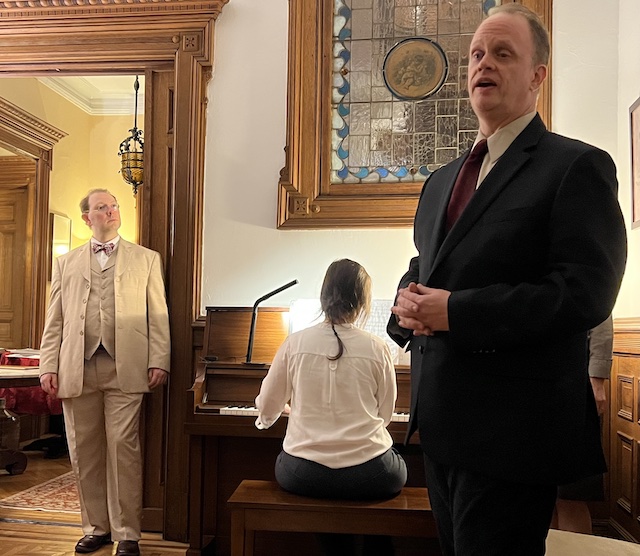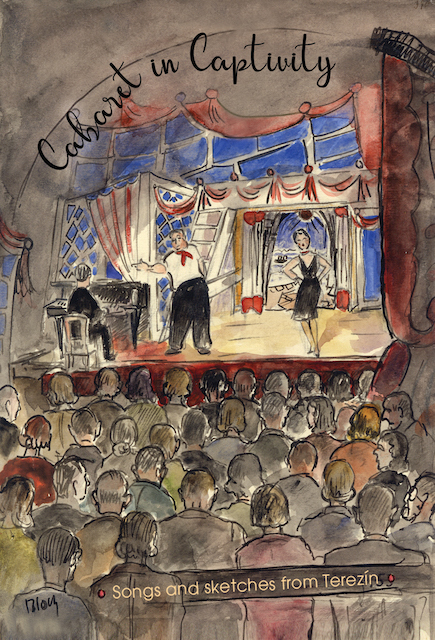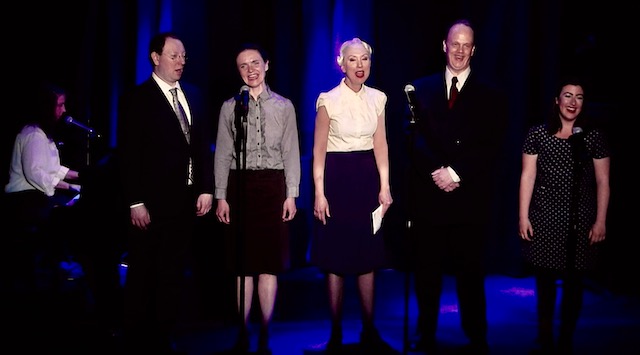
BY TRAV S.D. | There is no adjective, certainly none in English anyway, to describe the emotions stirred up by Cabaret in Captivity: Songs and Sketches Written in Terezin, presented by Untitled Theater Company No. 61 (UTC61) as part of the National Jewish Theater Foundation’s Holocaust Theater Initiative. “Bittersweet” doesn’t cover it, for “bitter” won’t do to capture the awfulness of the Holocaust, and “sweet” is inadequate for the celebratory revenge of reviving about a dozen of its victims, if only for about an hour, through the agency of a handful of dedicated and loving interpreters. And neither half of the word, however intensified, could describe the suggestion of theatrical magic inherent in reviving dead souls.
Terezin, or the Theresienstadt Ghetto, was a concentration camp established in Czechoslovakia in 1941. While 33,000 of those interned there died from malnutrition and disease, the prison was known as more of a gateway to the true extermination camps. Many more prominent Jews were imprisoned at Terezin for a time, and conditions were misrepresented to international authorities to make them seem better than they were.
As part of that charade, a certain amount of internal freedom was permitted, including camp entertainments organized and performed by prisoners who had been professional stage people in the European capitals under Nazi control: comedians, actors, musicians, singers, songwriters, and so forth. Remarkably, records were kept of some of the material they performed, and much of it was gathered, translated, and edited by scholar Lisa Peschel in the 2014 book Performing Captivity, Performing Escape: Cabarets and Plays from the Terezín/Theresienstadt Ghetto. UTC61’s Edward Einhorn and Jenny Lee Mitchell adapted over two dozen of these songs, monologues, stories, and sketches, and present them, with a great deal of respect and care, in a simple variety show format in the present production.

The pieces vary in tone. There is sorrow in some, also bitterness, biting wit, ironic humor, thinly veiled anger. Naturally the original presenters weren’t free to attack their captors in an overt and direct fashion. A lot of the humor in the show, and there’s plenty of it, consists of somewhat passive aggressive kidding about the horrible conditions, hunger, cold, vermin, and such like, as well as sadness about being stripped of their personal belongings and the dignity that went with them. I was particularly moved by a sarcastic “fashion show”—where starvation and the shaving of women’s hair are satirized by the narrator as beauty trends. There is a cruelty of robbing women of their glamor that is nearly as outrageous and heartbreaking as the harsher privations, for it had to have been a blow to their spirits. There are many kinds of murders.
But there is something glorious and fierce about these voices surviving long after those of the memories of their captors have died in disgrace. Thanks to this production you can hear, however briefly, the words and music of Armin Berg, Robert Dauber, Sergei Dreznin, Grigory Flidlider, Hans Hofer, Vitezslav “Pidla” Horpatzky, Jaroslav Jezek, Frantisek Kowanitz, Josepf Lustig, Feliz Porges, Frida Rosenthal, Erwin Schulhoff, Leo Strauss, Myra Strauss-Gruhenberg, Karel Svenk, and Ilse Weber some 80 years after they experienced these crimes against their humanity. I guarantee to you that it’s worth doing. There’s something about this show that makes me want to see it again, maybe see it every year.
“Cabaret in Captivity” (songs and sketches written in Terezín), from Lisa Peschel’s anthology “Performing Captivity, Performing Escape” and other sources: Conceived by Edward Einhorn. Developed and directed by Edward Einhorn and Jenny Lee Mitchell. With: Craig Anderson, Seth Gilman, Jenny Lee Mitchell, Alyson Leigh Rosenfeld, and Katarina Vizina. Musical Direction & Piano Accompaniment: Maria Dessena. Violin: Tiffaney Lane. Original work written by Armin Berg, Robert Dauber, Sergei Dreznin, Grigory Flidlider, Hans Hofer, Vitezslav “Pidla” Horpatzky, Jaroslav Jezek, Frantisek Kowanitz, Josepf Lustig, Feliz Porges, Frida Rosenthal, Leo Strauss, Myra Strauss-Gruhenberg, Karel Svenk, and Ilse Weber. Cast: Craig Anderson, Seth Gilman, Jenny Lee Mitchell, Alyson Leigh Rosenfeld, and Katarina Vizina, with special guest Tony Torn.
Saturday, March 18 at 8pm and Sunday, March 19 at 5pm at Torn Page (435 W. 22nd St. btw. 9th & 10th Aves.), with Special Guest: Tony Torn. For tickets and more info, click here. Also playing Sunday, April 16, 5pm at Bohemian National Hall (321 E. 73rd St.) followed by a discussion with Ukrainian performer Anna Zineko about performing in times of war and hardship.

Chelsea Community News is an independent, hyperlocal news, arts, events, info, and opinion website made possible with the help of our awesome advertisers and the support of our readers. Our Promise: Never a paywall, no pop-up ads, all content is FREE. With that in mind, if circumstances allow, please consider taking part in our GoFundMe campaign (click here). To make a direct donation, give feedback, send a Letter to the Editor, or contact our founder/editor, send an email to Scott Stiffler, via scott@chelseacommunitynews.com.
To join our subscriber list, click here. It’s a free service provding regular (weekly, at least) Enewsletters containing links to recently published content. Subscribers also will be sent email with “Sponsored Content” in the subject line. That means it’s an exclusive message from one of our advertisers, whose support, like yours, allows us to offer all content free of charge.

Pingback: A Post for Holocaust Remembrance Day – (Travalanche)
Pingback: The Return of “Cabaret in Captivity” – (Travalanche)